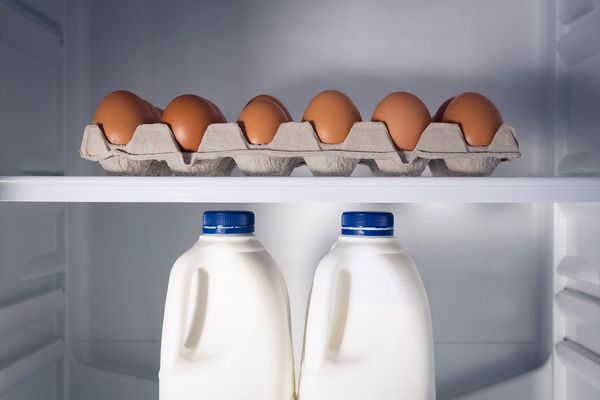
This is the part three of an investigative series. Find part one here and part two here.
Reporting on the AUKUS pact has focused almost entirely on Australia’s dealings with the United States, mainly because the US holds the key to the nuclear technology. This has fed a perception that the UK is a bit player.
In truth Scott Morrison had no greater ally than fellow political conservative Boris Johnson, who grabbed on to AUKUS as a domestic political life raft and a foreign affairs fix for the UK which was seeking to project global ambitions post-Brexit.
In March 2021 — six months out from the September AUKUS announcement — Australia’s Chief of Navy Vice-Admiral Michael Noonan initiated a meeting with his UK counterpart, Britain’s First Sea Lord, Admiral Sir Tony Radakin. The meeting was held at the Australian high commission in London where former Liberal attorney-general George Brandis presided as high commissioner. (Brandis is now a professor of security at the ANU. He declined to answer any of Crikey’s questions.)
That meeting led to Britain embarking on its own secret machinations under the codename Operation Hookless. It is a heady boys’ own mix. Secrets. The Royal Navy. Billions of dollars in Defence contracts. Possibly a Bond character or two, with China taking the place of the evil SPECTRE.
The Times reported a government source saying that “an excited Johnson” was keen for the deal to be something much bigger than submarines: “Boris was pushing that it had to be as ambitious as possible, that his was a strategic move.”
What’s in it for the UK?
Addressing the UK Parliament, Johnson framed AUKUS as a win for “skilled jobs” across the UK, “including in Scotland, the north of England and the Midlands”, naming the traditional Labour, pro-Brexit seats won by the Tories at the last election.
Only two days after AUKUS was announced, the British government awarded contracts to BAE Systems — which runs the Barrow-in-Furness shipyards in the north of England — and to Rolls-Royce for initial design work on a generation of nuclear-powered submarines for the Royal Navy.
Johnson also presented AUKUS as evidence of Britain’s new globalism, with its push into the Indo-Pacific. The announcement came a day before the EU’s Franco-German-led strategy for the Indo-Pacific saw the light of day.
Johnson told Parliament that with AUKUS “we expect to accelerate the development of other advanced defence systems, including in cyber, artificial intelligence, quantum computing and undersea capabilities”.
The possibilities for the British military-industrial complex are, seemingly, endless — as they might be for Johnson himself in a post-politics career.
At the centre of Britain’s effort is BAE Systems, the largest defence contractor in Europe, and seventh-largest in the world. It already has several multigazillion-dollar contracts with the Australian Defence Department, including building Hunter Class-frigates at the Osborne Naval Shipyard in South Australia.
BAE Systems Australia, a wholly owned subsidiary of UK-headquartered BAE, has been the leading defence contractor in Australia for the past three years, ahead of Thales Australia and Boeing. Its 2021 turnover was more than $1.3 billion, according to Australian Defence Magazine.
BAE’s political connections
Johnson went out of his way to meet Australia’s Defence Minister Richard Marles earlier this month during his visit to BAE Systems’ shipyards. At the same time Lord Mark Sedwill, a former civil service official who worked for Johnson, is set to join the BAE Systems UK board.
Australia’s tens of billions of dollars can go a long way to supporting Britain’s domestic needs, as sketched out by Johnson. Dr Euan Graham, senior fellow for Asia-Pacific security at the International Institute for Strategic Studies in Singapore, said it was relevant that “the spark” for AUKUS was originally “a bilateral approach from Australia’s chief of navy to his British counterpart”.
“If Canberra opts for a US submarine, the UK will respect that without histrionics, I suspect,” he wrote in the weeks after the AUKUS announcement last year when the focus was almost exclusively on the US. “It helps to remember that Australia first approached the UK — just as it is still remembered in Tokyo that former prime minister Tony Abbott knocked on his Japanese counterpart Shinzo Abe’s door to sound him out about submarine opportunities.”
Twelve months later Graham sees the biggest change as being that two of the three leaders who signed the deal, Morrison and Johnson, are no longer in office, with US President Joe Biden, the least enthusiastic, the only leader left standing.
“However, the drives of this are strategic, rather than political,” Graham said, “so the change isn’t so critical.”
It had also become clearer that the timeline for delivering the submarines had “only got worse”, due to industrial capacity in the UK and the US being “maxed out” meeting their own defence needs.
“The capability gap is much more than was publicly acknowledged before,” Graham said. “And it always comes back to how much Australia can do on its own.”
Graham said the “undersea capabilities” strand to AUKUS — commonly taken to include underwater drones — also had “some potential to fill the submarine capability gap” left by the long (and perhaps lengthening) production schedule for Australia’s nuclear submarines.
Johnson concluded his farewell address with a typically cryptic/comical reference: “I’m now like one of those booster rockets that has fulfilled its function. I will now be gently re-entering the atmosphere and splashing down invisibly in some corner of the Pacific.”
Might he bob up in some form of AUKUS role with the British government or BAE?
Meanwhile, Brandis stresses, new UK Prime Minister Liz Truss is “every bit as enthusiastic” for AUKUS as was Johnson.
No doubt.
Tomorrow: can Anthony Albanese dump the AUKUS subs deal?
If you have any information about this story you would like to pass on please contact David Hardaker via dhardaker@protonmail.com.







